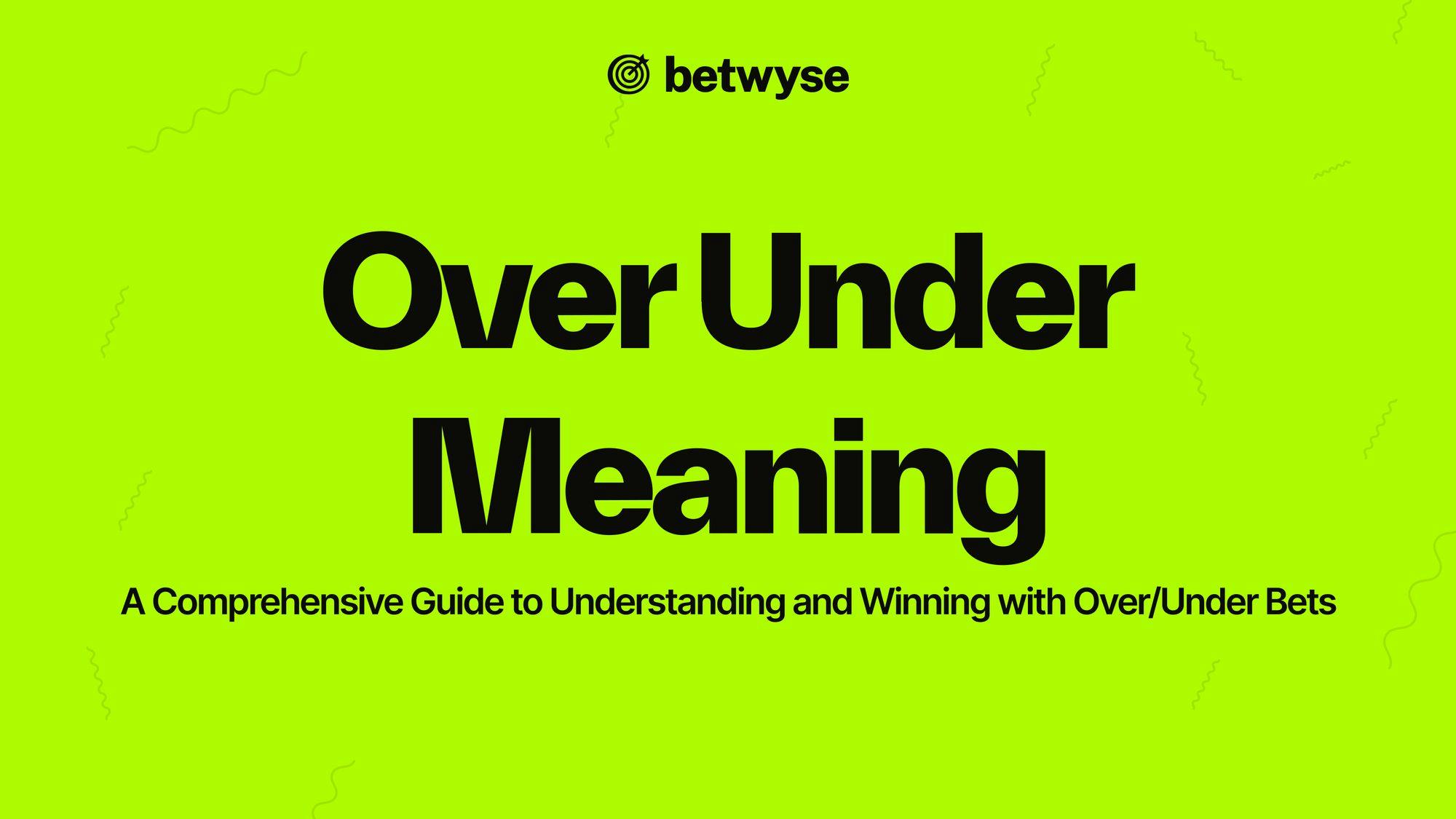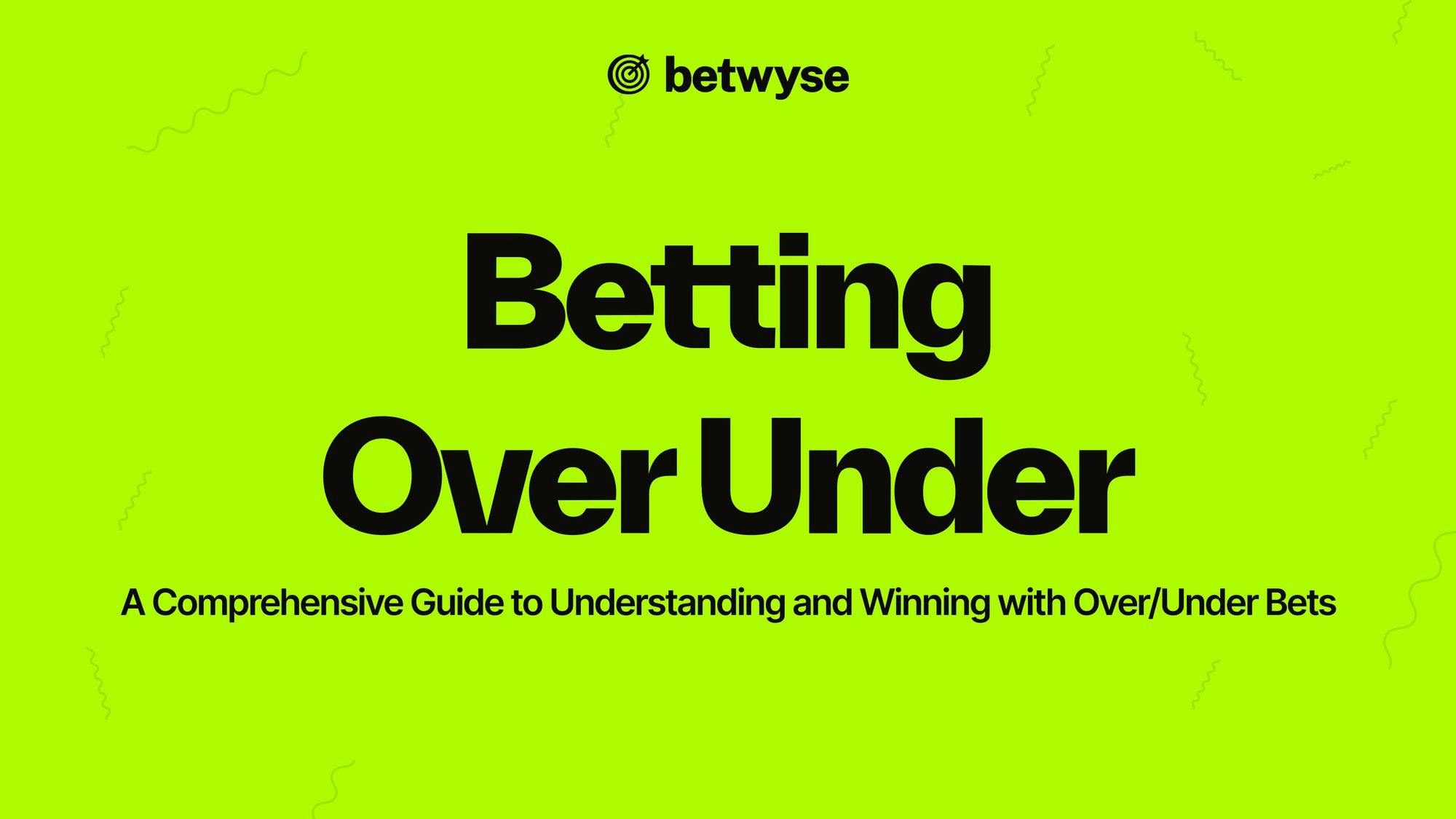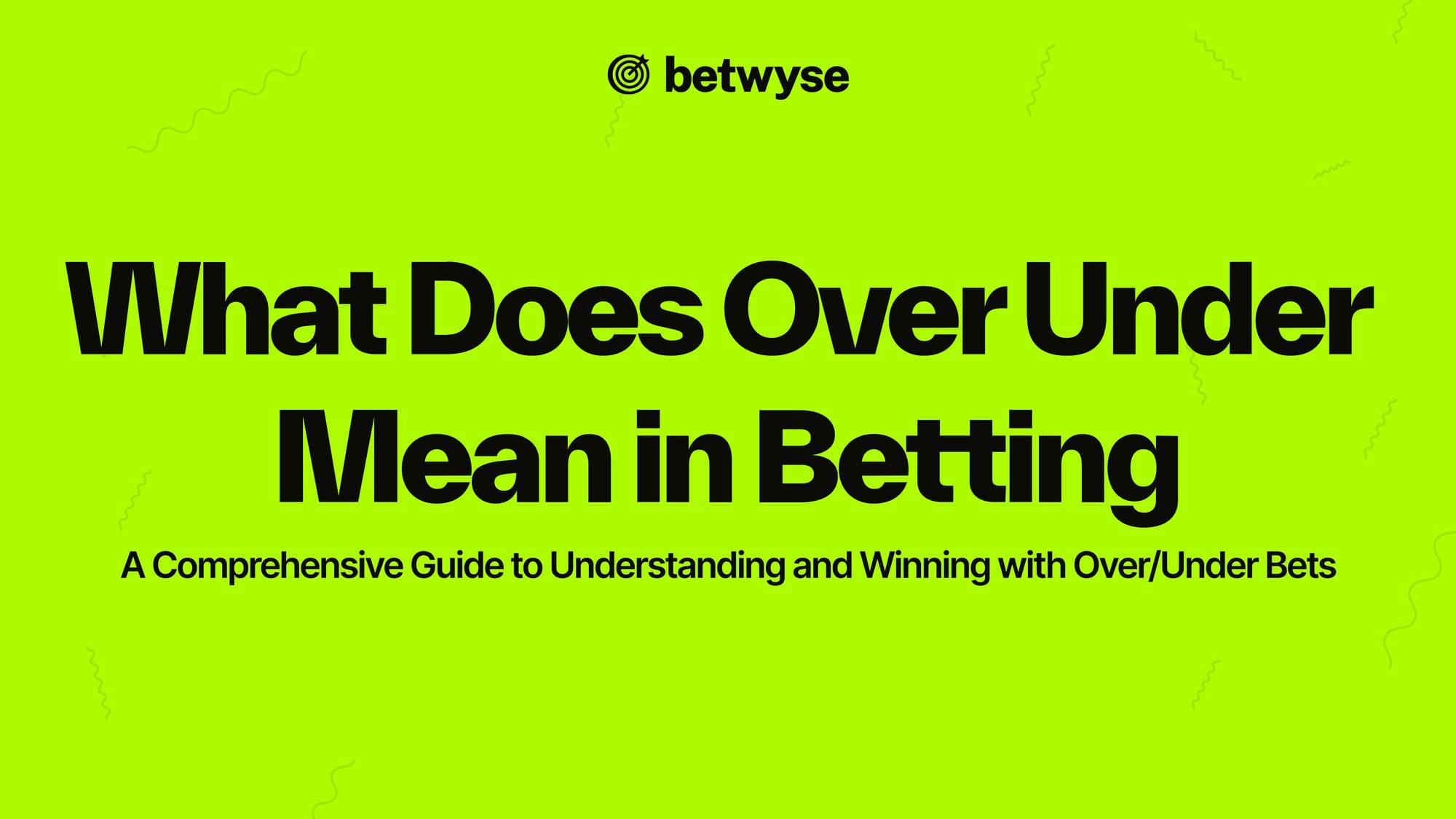When it comes to sports betting, there are many types of bets that you can place. One of the most popular types of bets is the over/under bet. This type of bet is also known as a total bet. It involves predicting whether a specific statistic for a game will be higher or lower than a pre-agreed value. The most common over/under bets are for the total points, runs, or goals scored in a game.
Over/under betting is a simple way to bet on sports. It is a popular choice among bettors because it allows them to bet on the outcome of a game without having to predict the winner. Instead, you are betting on whether the game's total score will be over or under a certain number. Most sportsbooks offer this kind of wager. It is available for various sports, including football, basketball, baseball, and soccer. If you are new to sports betting, over/under betting is a great place to start. It is easy to understand and can be a lot of fun.
Understanding Over/Under Betting
Over/Under betting, also known as totals betting, is a popular type of sports betting where you predict whether a specific statistic for a game will be higher or lower than a pre-agreed value. This statistic could be anything from the total points scored in a basketball game to the number of goals scored in a soccer match.
When you place an over/under bet, you are essentially betting on whether the final score of the game will be higher or lower than the predetermined value that the sportsbook has set. If you bet on the over, you are betting that the game's total score will be higher than the set value. If you bet on the under, you are betting that the game's total score will be lower than the set value.
It's important to note that over/under bets are not limited to the game's final score. You can also bet on the total number of points scored in a quarter or half of a game, the total number of yards a team gains, or any other statistic the sportsbook offers.
Remember that over/under bets can result in a push, which means that the game's final score equals the predetermined value set by the sportsbook. Your bet is refunded in this case, and you neither win nor lose any money.
Over/under betting is a straightforward and exciting way to bet on sports. Depending on your bet, you can focus on a specific statistic and root for a high-scoring or low-scoring game.
How Over/Under Betting Works
Over/Under betting is a popular form of sports betting where you wager on whether the total points scored in a game will be over or under a predetermined number set by the sportsbook. This type of bet is also known as a total bet.
In an over/under bet, the sportsbook sets a line for the total points scored in a game, and you bet on whether the actual total points scored will be over or under that line. For example, if a basketball game's over/under line is set at 200 points, you can bet on whether the total points scored will be over or under 200.
When you place an over/under bet, you are not betting which team will win. Instead, you are betting on the total points scored in the game. This makes it a popular option for bettors who want to enjoy the game without having to pick a winner.
In an over/under bet, you can bet on either the over or the under. If you bet on the over, you win if the total points scored in the game are higher than the over/under line. If you bet on the under, you win if the total points scored in the game are lower than the over/under line.
If the total points scored in the game are equal to the over/under line, the bet is considered a push, and your wager is refunded. Sportsbooks may sometimes set the over/under line with a half-point to avoid a push.
The odds for over/under bets are typically set at -110, which means you need to bet $110 to win $100. This is known as the juice or the vigorish. The juice ensures that the sportsbook makes a profit regardless of the game's outcome.
In summary, over/under is a popular form of sports betting where you bet on whether the total points scored in a game will be over or under a predetermined number set by the sportsbook. It is a simple and exciting way to enjoy the game without picking a winner.
Over/Under Betting in Different Sports
When it comes to sports betting, one of the most popular types of bets is the over/under bet, also known as a total bet. This type of bet involves wagering whether a specific game statistic will be higher or lower than a quoted value. The most common statistic used for over/under bets is the total number of points scored by both teams in a game, but other statistics such as rushing yards, assists, home runs, and goals can also be used.
Football Over/Under Betting
Football is one of the most popular sports for over- and under-betting. In football, the most common statistic used for over/under bets is the total number of points scored by both teams. Bettors can wager on whether the total number of points scored will be over or under a certain number set by the bookmaker. Other statistics that can be used for over/under bets in football include turnovers, quarterback completions, rushing yards, and down conversions.
Basketball Over/Under Betting
Basketball is another popular sport for over- and under-betting. In basketball, the most common statistic used for over/under bets is the total number of points scored by both teams. Bettors can wager on whether the total number of points scored will be over or under a certain number set by the bookmaker. Other statistics that can be used for over/under bets in basketball include assists, blocks, and steals.
Baseball Over/Under Betting
Baseball is a sport that offers over- and under-betting options. Still, most bets on this sport are based on the moneyline, point spread, and run line. In baseball, the most common statistic used for over/under bets is the total number of runs scored by both teams. Bettors can wager on whether the total number of runs scored will be over or under a certain number set by the bookmaker. Other statistics that can be used for over/under bets in baseball include RBI, home runs, and total number of shots.
Hockey Over/Under Betting
Hockey is another sport that offers over- and under-betting options. Still, most bets on this sport are based on the moneyline, point spread, and puck line. In hockey, the most common statistic used for over/under bets is the total number of goals scored by both teams in a game. Bettors can wager on whether the total number of goals scored will be over or under a certain number set by the bookmaker. Other statistics that can be used for over/under bets in hockey include assists, blocks, and steals.
Factors Influencing Over/Under Betting
When making an over/under wager, there are several factors to consider that can impact the outcome of the bet. Here are some of the most important factors to keep in mind:
Weather
Weather can play a significant role in the outcome of a game, particularly in outdoor sports like football and baseball. Wind, rain, and extreme temperatures can all impact the ability of players to perform. It can also affect the way that the ball moves. As a result, it's important to consider the weather forecast when making an over/under bet.
Offenses and defenses
The strength of the offenses and defenses for each team can also impact an over/under bet outcome. For example, if both teams have strong offenses and weak defenses, it's more likely that the total points scored will be high. On the other hand, if both teams have strong defenses and weak offenses, it's more likely that the total points scored will be low.
Injuries
Injuries to key players can also impact an over/under bet outcome. For example, if a team's star quarterback is injured, the team will likely struggle to score points. Similarly, if a team's top defender is injured, it's more likely that the opposing team will be able to score more points.
Trends
Looking at trends can also be helpful when making an over/under bet. For example, if a team has consistently scored a high number of points in their last few games, it's more likely that they will continue to do so in their next game. Similarly, if a team has consistently allowed a low number of points in their last few games, it's more likely that they will continue to do so in their next game.
Conclusion
When making an over/under bet, it's important to consider a variety of factors that can impact the outcome of the bet. By considering weather, offenses, defenses, injuries, and trends, you can make a more informed wager that is more likely to be successful.
Tips for Over/Under Betting
When it comes to over- or under-betting, you can do a few things to increase your chances of success. Here are some tips to keep in mind:
- Do your research.
Before placing your wager, make sure you do your research on the teams or players involved in the game. Look at their recent performances, injuries, and other relevant factors that could affect the game's outcome.
- Understand the Over/Under Line
The over/under line is the total number of points the sportsbook expects to score in the game. It's important to understand this line and how it relates to the points scored by each team. The overbet wins if the total points scored exceed the over/under line. The under bet wins if the total points scored are lower than the over/under line.
- Consider Trends
Look at trends for both teams or players involved in the game. Are they typically high-scoring or low-scoring? Do they tend to play better at home or on the road? These trends can give you a good idea of what to expect regarding the final score.
- Don't Always Bet the Over
While it can be tempting to always bet on the over, it's also important to consider the under. If the over/under line is particularly high, the under bet may be worth considering. Additionally, the underbet may be better if the weather conditions or other factors suggest a low-scoring game.
- Be prepared for a push.
A push is when the final score lands exactly on the over/under line. In this case, your wager will be refunded. It's important to be aware of this possibility and factor it into your betting strategy.
- Shop for the Best Odds
Finally, shop around for the best odds before placing your bet. Sportsbooks may offer different odds, so finding the best value for your wager is worth it.
Over/Under Betting Glossary
Over/under betting, or total betting, is a popular form of sports betting. It involves placing a wager on whether the total points scored in a game will be over or under a predetermined number set by the sportsbook. Here are some key terms and concepts to keep in mind when placing over/under bets:
- Over/Under: The terms "over" and "under" refer to whether the total points scored in a game will be higher or lower than the predetermined number set by the sportsbook.
- Total: The total is the predetermined number the sportsbook sets for the over/under bet.
- Push: A push occurs when the total points scored in a game exactly equal the predetermined number set by the sportsbook, resulting in a tie and a refund of the original wager.
- The commission the sportsbook levies on winning wagers is known as juice, also spelled vig or vigorish. It is typically 10% of the wager amount.
- Point spread: The point spread is a handicap given to the underdog team to level the playing field and make the betting more even.
- Moneyline: The moneyline is a type of bet that involves simply picking the winner of a game, regardless of the point spread.
- Prop bets: Prop bets, short for proposition bets, are bets on specific events or outcomes within a game, such as the number of turnovers or rushing yards by a particular player.
- Win total: A win total bet is a bet on the number of wins a team will have during a season.
When placing over/under bets, it's important to consider factors such as weather, injuries, and each team's offensive and defensive capabilities. It's also important to read and understand the sportsbook's terms and conditions and seek help if you have a gambling problem. By keeping these tips in mind and staying informed on the latest trends and statistics, you can increase your chances of making successful over/under bets.
Frequently Asked Questions
What is an over under bet example?
An over/under bet is a type of sports betting where a bookmaker sets a line for the total number of points or goals scored in a game. Then, bettors forecast whether the final score will be higher (over) or lower (under) than the odds set by the bookmaker. For example, if the line is set at 2.5 goals, a bettor would wager on whether the total number of goals scored in the game will be over or under 2.5.
What is the concept of over-under?
The idea behind over/under is to forecast whether the final score of a game will be higher or lower than a betting line. This type of betting is popular in sports such as football, basketball, and hockey.
How do you make an over-under bet?
To make an over/under bet, you first need to find a bookmaker that offers this type of betting. Once you have found a bookmaker, select the game or event you want to bet on. Next, you must choose whether to bet on the over or under. Finally, you must place your wager and wait for the game's outcome.
What does 2.5/3 mean?
Under 2.5 3 is an over/under bet commonly used in soccer betting. This type of bet means you win if the total number of goals scored in the game is less than 2.5. However, if the total number of goals scored in the game is 3, you will receive a refund for your bet.
What happens if you tie the over/under?
If you tie the over/under, your bet is considered a push, and your wager will be refunded. This means you will receive your original wager back but will not win any additional money.
How does the over/under work in sports betting?
The over/under works in sports betting by allowing bettors to predict whether the total score of a game will be higher or lower than a line set by a bookmaker. Bettors can then place wagers on the over or under and wait for the game's outcome. The bettor will win their wager whether the final score is higher or lower than the odds set by the bookmaker.



